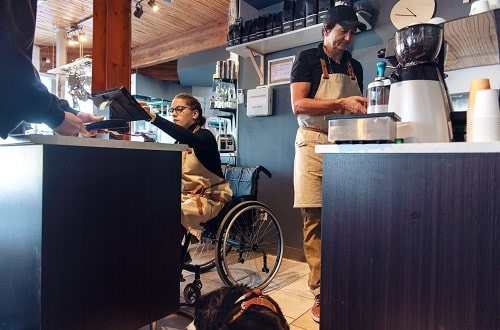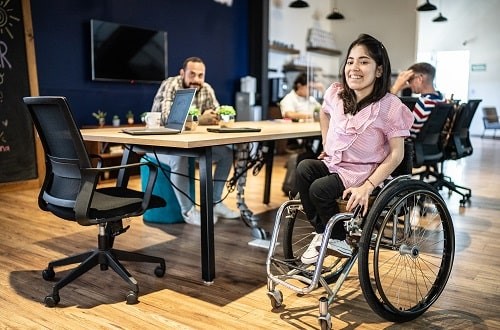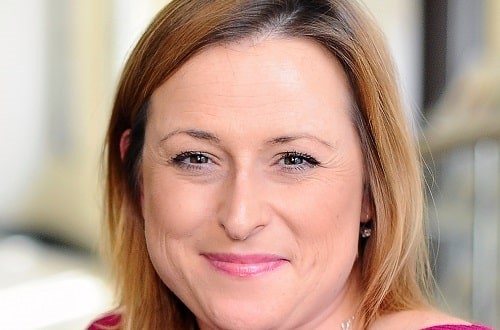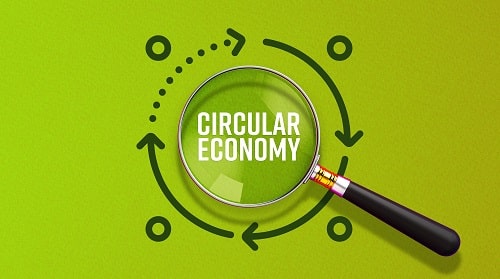Creating truly inclusive workplaces where disabled people can thrive brings many benefits for a business – and it all stems from supportive and sensitive conversations during the recruitment and workplace adjustment process.
Features
Disability – inclusion starts with a conversation
We have come a long way in the journey to inclusion and for most businesses, embracing the benefits of a diverse workforce is a priority.
But disability is often the least talked about, despite being the largest minority group in the world. When you think that there are around 16 million people in the UK who are considered to be disabled, you might wonder where they all are. The reality is that our perception of disability and what a disabled person looks like is often quite wrong.
 Photograph: iStock/lise gagne
Photograph: iStock/lise gagne
As a wheelchair-user, I fit the stereotypical image of a disabled person. Well, almost – I’m sadly not a superhuman Paralympian (just an employment lawyer and mother of three), but nonetheless I tick many of the boxes with my blue badge and shiny wheels. Interestingly though, only around one million disabled people use wheelchairs in the UK but the images you get when you google ‘disability’ might lead you to a different conclusion.
The definition of disability from a legal point of view is someone with a long-term, physical or mental impairment that substantially and adversely impacts on their everyday activities – when you consider this, you can see quite how many people are likely to fall within this. Strikingly, over 80 per cent of disabilities are in fact hidden so it is good to remind ourselves how many people we are likely to be surrounded by who are living with conditions that significantly affect their everyday life in difficult ways.
Recruitment practices
So, given that disability is not this tiny group of people who are either superhuman or, at the opposite end of the stereotype, people who cannot care for themselves, how then are we not yet embracing disability fully in our workplaces? The answer is complicated but, without doubt, a contributing factor begins with our recruitment practices. If you don’t open the door wide enough, people aren’t going to come in. Recent government statistics show that almost 50 per cent of working-age disabled adults are unemployed. That is a significant amount of wasted talent.Things are only going to improve if we include our disabled applicants in our recruitment processes and make our workplaces as accessible and inclusive as possible.
I have always worked for large employers where adjustments have been offered at an early stage, but that is not usually the experience of disabled job applicants, particularly if their disability needs appear complex or uncomfortable.
When I think about the barriers I have faced in my career, it is not the lack of a lift or accessible parking that is the main problem (although I have had my share of that too), it is the perception of others who initially assume that I am not as intelligent, capable or ambitious as my non-disabled colleagues, despite my qualifications and experienced CV. When I consider the difficulties I have faced with what is a relatively straightforward and obvious disability, I can only imagine the experience of others who need a few more adjustments to make their working lives equitable. So, what can we do to redress this imbalance?
For me, a large part of the problem comes with fear. Fear of saying something wrong, getting it wrong or being put in an uncomfortable situation. Discomfort means many people don’t say anything at all, so the idea of going through an interview with someone who has bravely declared their disability is hugely off-putting. And, to be fair, no one enjoys being put in an uncomfortable position.
So how do we get past this barrier to see the person behind the disability? For me, it starts with a conversation. And not one that begins with, “why do you use a wheelchair” but one that starts with, “tell me why you would be great for this job”.
 Photograph: iStock/FG Trade Latin
Photograph: iStock/FG Trade Latin
If a person applies for a job in your company and their CV suggests they have valid experience, don’t let your biases about disability, adjustments and practicalities get in the way of giving them a chance to show you what they can do. Don’t let your discomfort stop you from having a conversation. For most disabled people, they are all too used to helping people through this and compensating for any awkward moments.
Adjusting perceptions
If we can adjust our perception of disability, I am convinced inclusion will follow. We need to rethink what disability looks like and stop thinking of disabled people as this distinct group sat up on an isolated, accessible platform at a music concert or restricted to the accessible seating on the train.
Too often I hear of disabled people not being given a role, a promotion, a project, because of an assumption that it will be too tiring or too challenging.
All dressed up as kindness and being helpful but the inevitable consequence is a type of benevolent bias that simply removes a disabled person’s agency. There is a difference between providing reasonable adjustments to remove a disadvantage someone is experiencing and denying a disabled person the opportunity to thrive and to achieve the most success they can. It takes me back to childhood – when told I should consider a musical instrument that was small and easy to handle, I stubbornly chose the largest saxophone I could find in the shop. Give me a challenge and I will rise to it.
Much can be achieved, of course, with raising awareness within our workplaces. If you think that one in five of us are likely to have a disability, you don’t have to look very far to come across a colleague who probably has something that they are not being open about.
In the legal industry, neurodiversity is something we are starting to embrace, and more and more employers look to champion our neurodivergent colleagues by better understanding how we can support them and how we can learn from them.
Simple adjustments in the recruitment process can hugely level an uneven playing field for a disabled candidate. If a job applicant tells you they have ADHD (attention deficit hyperactivity disorder) and asks if you will share the interview questions in advance to avoid the significant stress that ‘on the spot’ questions can cause them, do you need to turn this request down based on some pre-conceived idea of how an interview should run? How about you give all candidates the opportunity to do a little pre-interview prep – if the role doesn’t need to test how someone thinks on their feet, then why are you doing it that way?
 Lucy Hendley is an employment solicitor and head of client training at Lewis Silkin LLP, and a wheelchair user herself. Photograph: Lewis Silkin
Lucy Hendley is an employment solicitor and head of client training at Lewis Silkin LLP, and a wheelchair user herself. Photograph: Lewis Silkin
Of course, you are still entitled to require a person to be able to do the job you need, and just because they have a disability doesn’t mean you have to ignore it. Let’s be honest, if I rocked up to an interview for a scaffolder job, you could understand a few concerns being raised about my ability to perform an essential requirement of the job. But the trick is not to assume an ability or lack of ability just based on your knowledge or your assumptions about someone’s condition. For all you know, I could be a dab hand at levitating and balancing on narrow ledges… it’s at this point that it is okay to ask about the adjustments a person might need to be able to do the job – this is far better than simply assuming it isn’t going to be possible.
Inclusion doesn’t end, however, once your disabled colleague gets the job. True inclusion is making sure your colleague can participate in working life in the same way as their non-disabled colleagues. That means having access to the same training opportunities, enabling them to have their voice and opinions heard in meetings and being given the same promotion prospects as anyone else, even if the job is being done a slightly different way.
Sometimes it is the small things that have the most impact. For me, the colleague who created a cupboard for me with my own set of coffee mugs, glasses and tea bags at an accessible height means I feel valued. The drinks event being held in an upstairs bar without access, not so much.
Holding conversations
Much can be gained from the conversation. From my perspective, I have a very easy to identify disability and the adjustments I might need will be obvious. For employees with hidden disabilities, it can be more difficult and it is a tough decision whether or not to share the disability with an employer or an individual manager.
Inevitably, they will have had a previous negative experience of doing so, either because people started to treat them differently or they did not then get the support they were hoping for. We need to ensure our workplaces are welcoming from the outset – we need to switch our mindset to what might be possible. The more we can encourage an employee to be open about the adjustments they need, the better they are going to perform in their role. Ultimately, it is a win-win.
If you are a manager, remember that you are often the first person an employee might come to if they have a concern. How you respond to that will determine how someone feels and what happens next.
I always encourage managers to start their one-to-one meeting with a simple, open, “how are you?” and if someone does share a health concern or a disability, it is important to handle this sensitively but confidently, without making any assumptions about what a person might need.
I recently observed an excellent example of this when a manager was told by her employee that she had been diagnosed with multiple sclerosis and she was worried about the impact this was going to have on her job and her relationships with her colleagues. It would have been easy for the manager to shy away from this conversation and make all sorts of plans to fill the employee’s role or remove some of their duties but, instead, the manager listened with sensitivity and then said, “I don’t know much about the condition but we can learn together – tell me what you need from me”. So simple, so effective.
There is much we can all learn about each other, and no experience of disability is the same. We will all get things wrong, but if we commit to learning more, listening more and assuming less, we can create an environment where disabled colleagues feel a part of the picture in every way. After all, if we all have the good fortune to live long enough, we will all be part of that community at some point.
Lucy Hendley is an employment solicitor and head of client training at Lewis Silkin LLP.
Contact her at:
FEATURES

How to build circular economy business models
By Chloe Miller, CC Consulting on 07 April 2025
Widespread adoption of a circular economy model by business would ensure greater environmental and economic value is extracted and retained from raw materials and products, while simultaneously reducing carbon emissions, protecting the environment and boosting business efficiency and reputation.

What does the first year on an accelerated net zero path have in store for UK businesses?
By Team Energy on 07 April 2025
The UK is halfway to net zero by 2050 and on a new, sped-up net zero pathway. In light of this, Graham Paul, sales, marketing & client services director at TEAM Energy, speaks to TEAM Energy’s efficiency and carbon reduction experts about the future of energy efficiency and net zero in the UK.

Aligning organisational culture with sustainability: a win, win for the environment and business
By Dr Keith Whitehead, British Safety Council on 04 April 2025
The culture of an organisation is crucial in determining how successfully it implements, integrates and achieves its sustainability and environmental goals and practices. However, there are a number of simple ways of ensuring a positive organisational culture where everyone is fully committed to achieving excellent sustainability performance.



